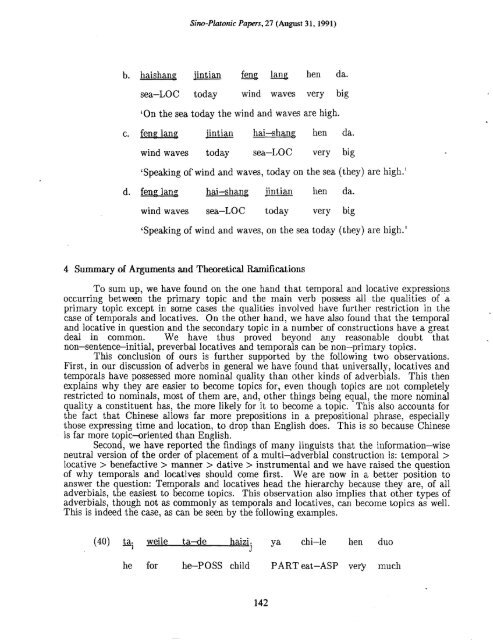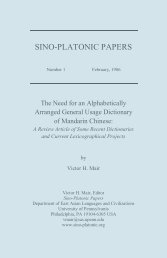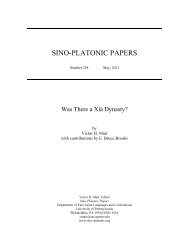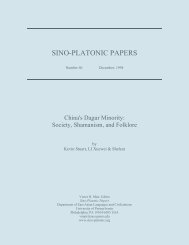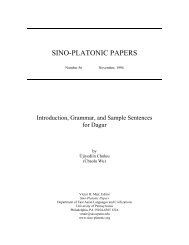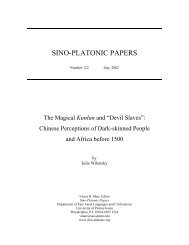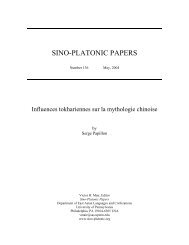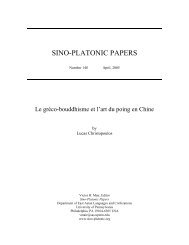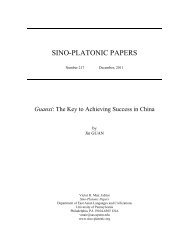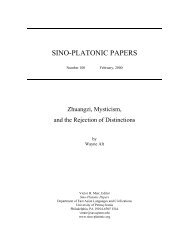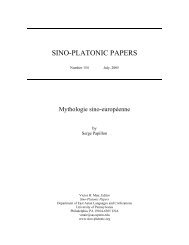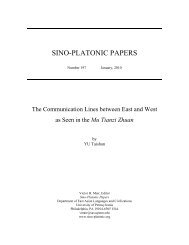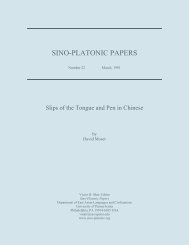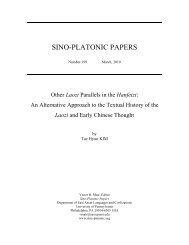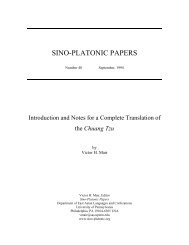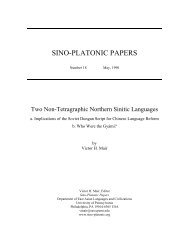Essays on Writing and Language in Honor - Sino-Platonic Papers
Essays on Writing and Language in Honor - Sino-Platonic Papers
Essays on Writing and Language in Honor - Sino-Platonic Papers
Create successful ePaper yourself
Turn your PDF publications into a flip-book with our unique Google optimized e-Paper software.
S<strong>in</strong>o-Plat<strong>on</strong>ic <strong>Papers</strong>, 27 (August 3 1, 1991)<br />
b. haishang j<strong>in</strong>tian feng lang hen da.<br />
sea-LOC today w<strong>in</strong>d waves very big<br />
(On the sea today the w<strong>in</strong>d <strong>and</strong> waves are high.<br />
c. fena lang j<strong>in</strong>tian haishang hen da.<br />
w<strong>in</strong>d waves today sea-LOC very big<br />
'Speak<strong>in</strong>g of w<strong>in</strong>d <strong>and</strong> waves, today <strong>on</strong> the sea (they) are high.'<br />
d. fene. lanq hai-shang 5ntia.n hen da.<br />
w<strong>in</strong>d waves sea-LOC today very big<br />
(Speak<strong>in</strong>g of w<strong>in</strong>d <strong>and</strong> waves, <strong>on</strong> the sea today (they) are high.'<br />
4 Summary of Arguments <strong>and</strong> Theoretical Ramificati<strong>on</strong>s<br />
To sum up, we have found <strong>on</strong> the <strong>on</strong>e h<strong>and</strong> that temporal <strong>and</strong> locative expressi<strong>on</strong>s<br />
occurr<strong>in</strong>g between the primary topic <strong>and</strong> the ma<strong>in</strong> verb possess all the qualities of a<br />
primary topic except <strong>in</strong> some cases the qualities <strong>in</strong>volved have further restricti<strong>on</strong> <strong>in</strong> the<br />
case of temporals <strong>and</strong> locatives. On the other h<strong>and</strong>, we have also found that the temporal<br />
<strong>and</strong> locative <strong>in</strong> questi<strong>on</strong> <strong>and</strong> the sec<strong>on</strong>dary topic <strong>in</strong> a number of c<strong>on</strong>structi<strong>on</strong>s have a great<br />
deal <strong>in</strong> comm<strong>on</strong>. We have thus proved bey<strong>on</strong>d any reas<strong>on</strong>able doubt that<br />
n<strong>on</strong>-sentence<strong>in</strong>itial, preverbal locatives <strong>and</strong> temporals can be n<strong>on</strong>-primary topics.<br />
This c<strong>on</strong>clusi<strong>on</strong> of ours is further supported by the follow<strong>in</strong>g two observati<strong>on</strong>s.<br />
First, <strong>in</strong> our discussi<strong>on</strong> of adverbs <strong>in</strong> general we have found that universally, locatives <strong>and</strong><br />
temporals have possessed more nom<strong>in</strong>al quality than other k<strong>in</strong>ds of adverbials. This then<br />
expla<strong>in</strong>s why they are easier to become topics for, even though topics are not completely<br />
restricted to norn<strong>in</strong>als, most of them are, <strong>and</strong>, other th<strong>in</strong>gs be<strong>in</strong>g equal, the more nom<strong>in</strong>al<br />
quality a c<strong>on</strong>stituent has, the more likely for it to become a topic. This also accounts for<br />
the fact that Ch<strong>in</strong>ese allows far more prepositi<strong>on</strong>s <strong>in</strong> a prepositi<strong>on</strong>al phrase, especially<br />
those express<strong>in</strong>g time <strong>and</strong> locati<strong>on</strong>, to drop than English does. This is so because Ch<strong>in</strong>ese<br />
is far more topic-oriented than English.<br />
Sec<strong>on</strong>d, we have reported the f<strong>in</strong>d<strong>in</strong> s of many l<strong>in</strong>guists that the <strong>in</strong>formati<strong>on</strong>-wise<br />
neutral versi<strong>on</strong> of the order of placement o f a multi-adverbial coi~structi<strong>on</strong> is: temporal ><br />
locative > benefactive > manner > dative > <strong>in</strong>strumental <strong>and</strong> we have raised the questi<strong>on</strong><br />
of why temporals <strong>and</strong> locatives should come first. We are now <strong>in</strong> a better positi<strong>on</strong> to<br />
answer the questi<strong>on</strong>: Temporals <strong>and</strong> locatives head the hierarchy because they are, of all<br />
adverbials, the easiest to become topics. This observati<strong>on</strong> also implies that other types of<br />
adverbials, though not as comm<strong>on</strong>ly as temporals <strong>and</strong> locatives, can become topics as well.<br />
This is <strong>in</strong>deed the case, as can be seen by t.he follow<strong>in</strong>g examples.<br />
(40) @ weile ta-de haizi ya chi-le<br />
j<br />
hen duo<br />
he for he-POSS child PARTeat-ASP very much


